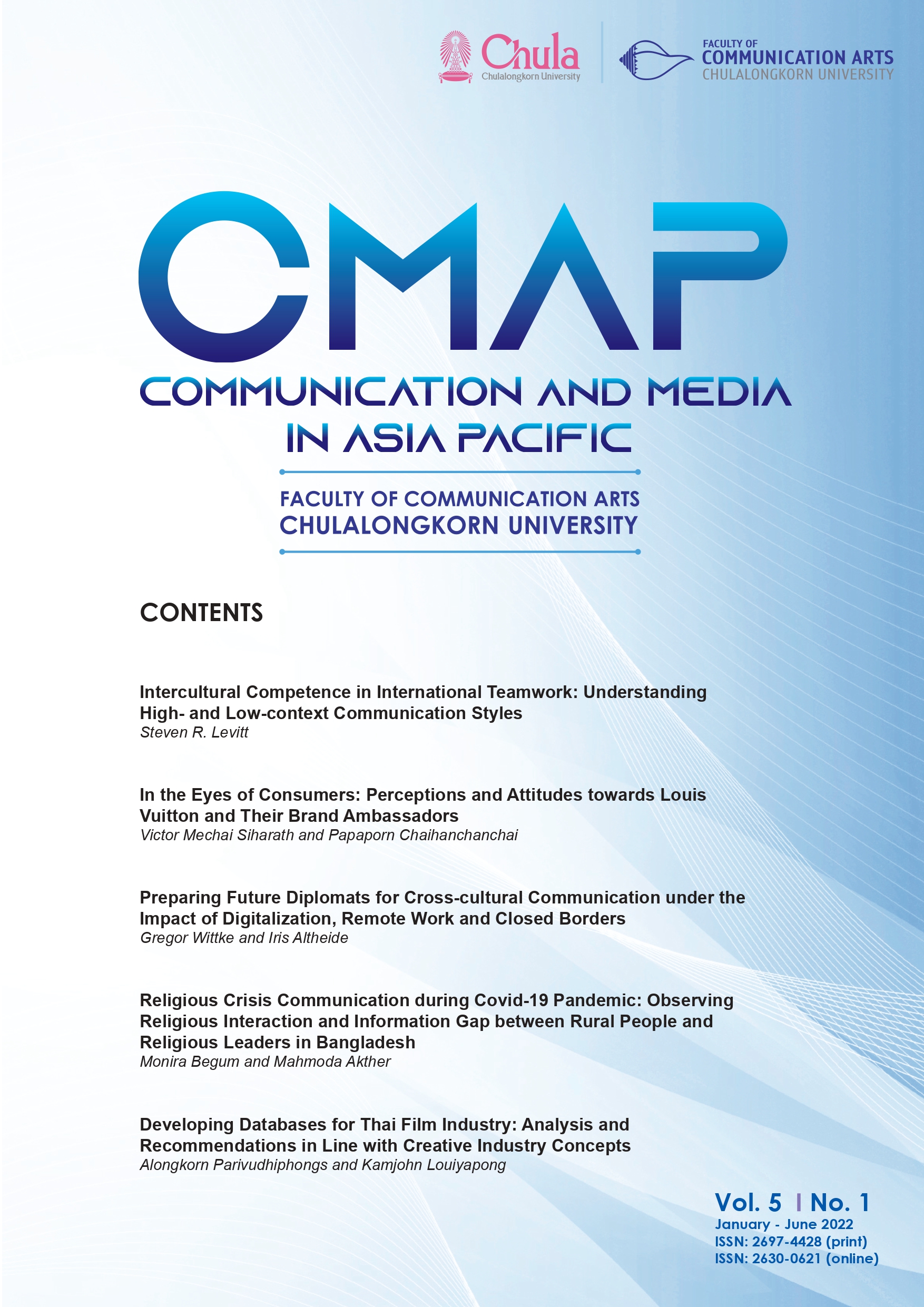Preparing Future Diplomats for Cross-cultural Communication under the Impact of Digitalization, Remote Work and Closed Borders
Main Article Content
Abstract
The purpose of this paper is to develop research hypotheses based on a case description. This describes the experience with a scientifically-based training for groups of future diplomats in cross-cultural communication online during the pandemic 2020/21 and uses “lessons learned” to also develop a concept for improved training considering more distant-communication online between different cultures. The results of this case analysis show that the cultural dimension “high context vs low context communication,” as used in the work of Schroll-Machl, Hofstede or Mayer, play an important role in training Germans in cross-cultural communication. A strengthened training focus on “self-reflection” with the goal to define and reflect advantages and disadvantages of the personal (German) cultural imprint and its possible effect on others can make up for the lack of high-context communication in online settings. As a conclusion, the objective “Differences between online-communication and face-to-face communication and its implications for intercultural exchange” is added to the training concept. This paper suggests hypotheses for future research such as “Cross-cultural online communication requires more 'low-context’ communication than face to face communication,” “Online communication eliminates context that is required for “low-context” communication styles.” And “Online intercultural trainings need new methods to teach low context communication, like virtual reality.”
Article Details
References
Antor, H. (2007). Inter-, multi- und transkulturelle kompetenz: Bildungsfaktor im zeitalter der globalisierung. fremde kulturen verstehen – fremde kulturen lehren. In H. Antor (Ed.), Theorie und praxis der vermittlung interkultureller kompetenz. (pp. 111-126). Heidelberg, Germany: Universitätsverlag Winter.
Arnold, M. (2015). Über die relevanz von erfahrungen in der interkulturellen trainingsforschung: drei verhältnisbestimmungen zwischen trainingsforschung und trainingspraxis. Interculture Journal: Online-Zeitschrift für interkulturelle Studien, 14(25), 11-28. https://nbn-resolving.org/urn:nbn:de:0168-ssoar-47115-3
Bolten, J. (2000). Interkultureller trainingsbedarf aus der perspektive der problemerfahrung entsandter führungskräfte. In K. Götz (Ed.), Interkulturelles Lernen / Interkulturelles Training (pp. 61-80). München, Germany: Intercultures.
Bundesministerium für bildung, wissenschaft und forschung (n.d.). Retrieved Nov 11, 2021, from https://www.mediamanual.at/mediamanual/workshop/kommunikation/ bedeutung/distanz01.php
Gertsen, M. (1990). Intercultural Competence and Expatriates. International Journal of Human Resources Management, 1, 341-362.
Grosch, H., & Leenen, W. R. (2000) Bausteine zur grundlegung interkulturellen lernens. Interkulturellen lernens: Arbeitshilfen für die politische Bildung. Bonn, Germany: Bundeszentrale für Politische Bildung.
Gullahorn, J. T., & Gullahorn, J. E. (1963). An extension of the U-curve hypothesis. Journal of Social Issues, 19(3), 33-47.
Hall, E. (1976) Beyond culture. Garden City, NY: Anchor Press.
Hofstede, G. (1991). Cultures and organizations: Software of the mind. New York: McGraw-Hill.
Hofstede, G. (2006). Lokales denken, globales handeln: Interkulturelle zusammenarbeit und globales management. Berlin, Germany: DTV-Beck.
Kallschmidt, A., Mesmer-Magnus, J., Viswesvaran, C., & Deshpande, S. (2020). Evaluation of cross-cultural training: A review. In D. Landis & D. Bhawuk (Eds.), The Cambridge Handbook of Intercultural Training (Cambridge Handbooks in Psychology, pp. 334-354). Cambridge, UK: Cambridge University Press. doi:10.1017/9781108854184.012
Karalus, K. (2009). Die diplomatische vertretung der Europäischen Union. Tübingen, Germany: Mohr Siebeck.
Kinast, E.-U. (1998). Evaluation interkultureller trainings. Lengerich, Germany: Pabst.
Littrell, L. N., & Salas, E. (2005). A review of cross-cultural training: Best practices, guidelines, and research needs. Human Resource Development Review. 4(3), 305-334. doi:10.1177/1534484305278348
Major of London and Transportation of London. (2008). Whodunnit. Retrieved Nov 14, 2021, from https://www.google.de/url?sa=t&rct=j&q=&esrc=s&source=web&cd=&cad=rja&uact=8&ved=2ahUKEwjinrHR2oj0AhXqR_EDHTnoAboQwqsBegQICBAB&url=https%3A%2F%2Fwww.youtube.com%2Fwatch%3Fv%3DubNF9QNEQLA&usg=AOvVaw1ZKjSi3jFmjzssZ6-fvh_X)
Mendenhall, M., Stahl, G., Ehnert, I., Oddou, G., Osland, J., & Kuhlmann, T. (2004). Evaluation studies of cross-cultural training programs: a review of the literature from 1988 to 2000. In D. Landis, J. M. Bennett, & M. J. Bennett (Eds.), Handbook of intercultural training (pp. 129-144). Beverly Hills, CA: Sage. https://dx.doi.org/10.4135/9781452231129.n5
Meyer, E. (2014). Culture maps. New York: PublicAffairs.
Nohl, A. M. (2006). Konzepte interkultureller pädagogik: Eine systematische Einführung. Bad Heilbrunn, Germany: Klinkhardt.
Ruch, F. L., & Zimbardo P. G. (1974). Lehrbuch der Psychologie: Eine Einführung für Studenten der Psychologie, Medizin und Pädagogik. Berlin, Germany: Springer.
Schein, E. (1990). Organizational culture. American Psychologist, 45(2), 109-119.
Schroll-Machl, S. (2002). Die Deutschen - Wir Deutsche: Fremdwahrnehmung und Selbstsicht im Berufsleben. Göttingen, Germany: Vandenhoeck & Ruprecht.
Schroll-Machl, S. (2016). Doing business with Germans: Their perception, our perception. Göttingen, Germany: Vandenhoeck & Ruprecht.


